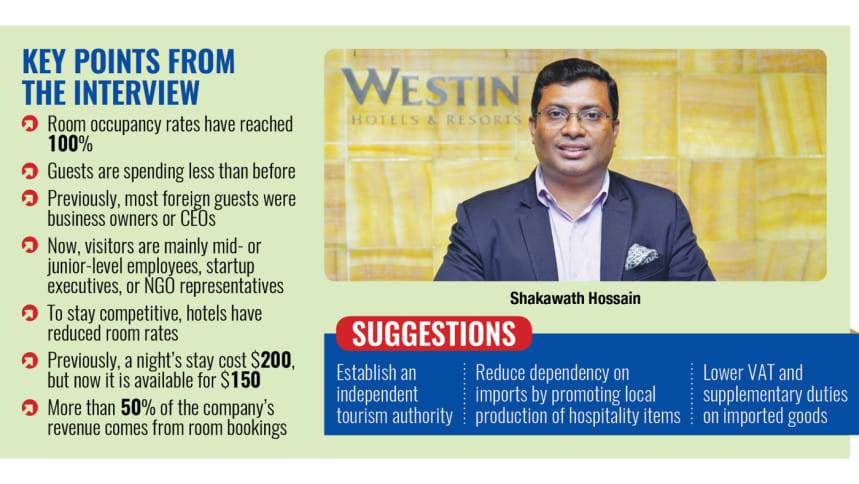Luxury hotels hit hard as political uncertainty deters foreign guests

Bangladesh's luxury hotel industry is experiencing a downturn as political uncertainty reduces the number of foreign guests, according to a top executive of the local hospitality sector.
The decline in international visitors is putting pressure on high-end hotels that rely heavily on business travelers and tourists, said Shakawath Hossain, chief executive officer of Unique Hotel & Resorts PLC, which owns The Westin Dhaka, Sheraton Dhaka, and HANSA.
"We are currently going through such an uncertain situation that nothing is clear," he said in an interview with The Daily Star on February 27.
He said that there is a travel ban on Japanese and Korean citizens to Bangladesh, while restrictions on American travelers have eased slightly. Visa restrictions for Indian citizens remain in place.
Providing a financial comparison, Hossain said that if the company earned Tk 20 crore in February 2023, revenue dropped to Tk 17 crore in the same month this year.
Although room occupancy rates appear to be 100 percent, guests are spending less, he explained. Although the revenue has declined, operational costs have remained unchanged.
Previously, the majority of foreign guests at their hotels were business owners or CEOs.
Now, visitors are mainly mid or junior-level employees, startup officials or NGO representatives. Some small business owners also make up a portion of the clientele, according to the CEO.
He said a significant portion of their customers used to come from India, but their numbers have fallen sharply due to the current political climate. Likewise, Japanese and Korean visitors are absent.
Businesspeople from most European countries are also staying away, Hossain further said.
"Currently, demand is low, but supply is high," said the CEO, who has over 20 years of experience in Bangladesh's tourism and hospitality industry.
To stay competitive, hotels have had to lower room rates. Previously, a night's stay at their hotel cost $200, but now it is available for just $150.
"If rooms remain vacant, we cannot survive. Our main objective now is to retain market share. Given the situation, we are quite concerned about law and order," he said.
He added that if the company previously had a 10 percent profit margin, it has now dropped to 8 percent.
"Operational costs remain unchanged at the end of the day and we must pay staff salaries at the end of the month. Besides, dividends must be distributed to shareholders at the end of the year," he said.
More than 50 percent of the company's revenue comes from room rentals, while 45 percent is generated from food and beverage sales. The remaining 5 percent comes from transportation, fitness and spa services.
Hossain mentioned that many international companies are interested in doing business with Unique Hotel & Resorts, but the current situation is not conducive to investment.
As a result, potential partners from Saudi Arabia, Dubai, Japan and China are adopting a wait-and-see approach.
He said that due to deteriorating law and order and various business challenges, the company recently met with Chief Adviser Professor Muhammad Yunus to express their concerns.
Highlighting import challenges, he noted that taxes on interior items and hotel furniture have risen to over 200 percent, compared to around 20 percent previously.
Besides, the import of premium meat has been halted, while hard liquor imports face an average duty of 600 percent. These tax burdens need to be revised, Hossain commented.
"There are no policymakers who truly understand the challenges of this industry. We need experienced professionals at the ministry level," he said.
Hossain suggested that Bangladesh should establish an independent Tourism Authority, with the ministry focusing solely on policy. Bureaucratic red tape is causing the country to lose out on significant opportunities, he added.
He encouraged young people interested in hospitality to pursue careers in the sector, describing it as "a highway with no traffic" and full of potential for growth.
To address industry challenges, he outlined three key priorities: appointing technically skilled and internationally experienced professionals at the ministry level, reducing dependency on imports by promoting local production and lowering VAT and supplementary duties on imported goods.

 For all latest news, follow The Daily Star's Google News channel.
For all latest news, follow The Daily Star's Google News channel. 





Comments